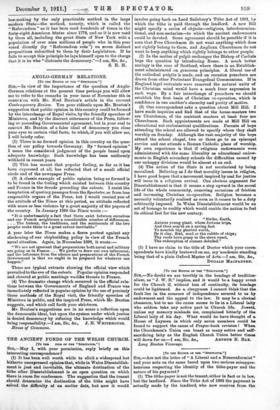ANGLO-GERMAN RELATIONS. [To THE EDITOR OF THE "SPECTATOR. " ] SIR,—In view
of the importance of the question of Anglo-
German relations at the present time perhaps you will allow me to refer• to the remarks in your issue of November 4th in connrxion. with Mr•. Noel Buxton's article in the current Contemporary Review. You pour ridicule upon Mr. Buxton's suggestion that public opinion in this country could be formed by the interchange of Royal visits, by the friendly speeches of Ministers, and by the discreet utterances of the Press, follow- ing or preceding Governmental agreement, but in your• zeal to convict Mr•. Buxton of a false ideal of democracy you close your eyes to certain vital facts, to which, if you will allow me,
I will briefly refer.
(1) There is no formed opinion in this country on the ques- tion of our policy towards Germany. By " formed opinion" I mean the considered judgment of the people based upon adequate knowledge. Such knowledge has been uniformly withheld in recent years.
(2) This has meant that popular feeling, so far as it has been expressed at all, has reflected that of a small official circle and of the newspaper Press.
(3) A classic example of public opinion being so formed is to be found in the feeling which existed between this country and France in the decade preceding the entente. I resist the temptation of quoting passages from the Spectator, or from less responsible organs of the Press, but I would remind you of the attitude of the Times at this period, an attitude reflected with more or less violence by a great majority of the papers of the country. In January 1896 the Times wrote :—
" It is unfortunately a fact that there exist between ourselves and our French neighbours a considerable number of differences. . . . The history, the traditions, and the sentiments of the two peoples make them to a great extent inevitable."
A year• later the Times makes a fierce protest against any slackening of our shipbuilding policy in view of the French
naval situation. Again, in November 1898, it wrote :-
" We are not ignorant that preparations both naval and military are going on in France. . . . We prefer to draw our own inferences; and the inference from the silence and preparations of the French Government is that we ought to be prepared for whatever can happen."
These are typical extracts showing the official view which
prevailed to the eve of the entente. Popular opinion responded and cheered at public meetings warlike threats to France.
(4) The dramatic change which occurred in the official rela- tions between the Governments of England and France was immediately reflected in popular opinion by the use of precisely those methods of the Royal visit, the friendly speeches of Ministers in public, and the inspired Press, which Mr. Buxton suggests, and which call forth your• strictures.
Mr. Buxton's suggestions are in no sense a reflection upon the democratic ideal, but upon the system under which justice House of Commons.


































































 Previous page
Previous page